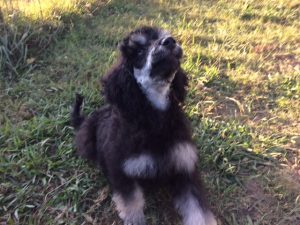- By : Hearts56bg
- Category : Puppies, Training
Socializing, what is it and how do you socialize a puppy?
Good socializing is exposing your puppy to as many new people, situations, places, things, smells and noises while they are developing that allows them to understand the world is a wonderful place to explore.
Socializing can prevent many unwanted behaviors and help a puppy to become easy to live with. Puppies that are kept outdoors, away from people and poorly socialized are more likely to become difficult to live with and end up being re-homed or turned into a shelter.
We strongly encourage you to enroll your puppy in a puppy class for early socialization with other dogs and people.
Responsible kids make good teachers, they play with toys, move around in noisy fun ways and naturally show a puppy a good time. Children that are friendly and respectful can teach a whole new world to puppies. Adults should supervise this play to help the puppy to learn good behaviors such as bite inhibition, and not to jump or chase.
Kids and adults who dress up in funny, colorful costumes and hats are a great way to expose puppies to all kinds of people and outfits.
Walking down a street or trail will expose your puppy to many new people and things.

What do you want to do now Mom?
Expose your puppy to as many: People, Places, Things, Noises, Smells, Surfaces as they are able to meet without becoming fearful. Use treats when needed, this will be often! Food is a great motivator that things are fun, fun, fun.
- People with hats, beards, different voices, different clothing, different smells. People carrying backpacks, riding bikes, skateboarding, jogging and carrying umbrellas are just a few of the situations that are helpful for a puppy to meet.
- Places such as walking trails, big box stores that allow pets such as Michael’s, Home Depot and Lowes, friends and family members homes, neighborhoods, puppy class.
- Things like wheel chairs, walkers, furniture, cars, trucks, toys of different textures – rubber, soft, squeaky, crinkly etc., bikes, blow some bubbles, get a puppy swimming pool, flush the commodes in your house, run a shower, ring the door bell, turn on the t.v., talk on the phone, all the everyday things you do.
- Noises such as the voices of friendly people, sirens (from a distance), airplanes, traffic, t.v, radio and videos, the wind in the trees, animal sounds. Dogs hear much better than we do, be mindful not to hurt their ears.
- Smells open up a bunch of things, some you will find obnoxious are going to be very interesting to your puppy. The trash can, food you’re cooking, smells when they are walking, new people, just about everything is good for a puppy nose. Remember to lock up household cleaners, oil, medicines and any dangerous chemicals. Many of these chemicals have added smells so they smell good. Puppies may eat them before you get a chance to put them up.
- Surfaces are places/things your puppy can safely walk or climb over. Carpet, vinyl floors, tile, hardwood, towels, blankets, grass, rocks, dirt, asphalt, concrete. Caution about steps and slippery floors: it is now known that puppies that repeatedly do steps or walk on slippery surfaces have a much higher risk of developing hip dysplasia. This does not mean you should not expose your puppy to them, it’s advised they don’t live on them on a daily basis.
Don’t be afraid to remove your puppy from any situation you believe is dangerous or will cause them to be fearful!! A puppy does not have to “get used to it” just because someone thinks it’s ok. All puppies have natural fear periods and natural variances in temperament just like children and need time to develop . Some poodles run full out not afraid of anything, most need more time to think about things and adjust. Poodles are smart, they interpret things in their own time and way. Watch your poodle for cues and let them approach something new at their own speed. Remember treat, treat, treat! Build your puppies confidence and you will have a wonderful life long partner.
Word of caution: Keep your puppy away from dog parks, pet stores, rescues and animal shelters until they are fully vaccinated. If you know someone whose pet has had parvo or distemper, avoid that home. Parvo may live in an area for as long as 7 years. There are plenty of places to socialize your pet with out going to these areas.
No Comments